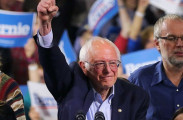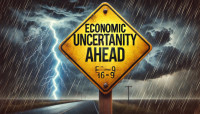In this Article:
- What happens when a president defies the courts and the law?
- How has history shown the dangers of unchecked presidential power?
- Could state governors lead resistance to federal overreach?
- Are whistleblowers silenced under these policies?
- What are the potential consequences for democracy?
What Happens When the President Ignores the Courts and the Law?
by Robert Jennings, InnerSelf.com
On January 20, 2025, Donald J. Trump took the oath of office for the second time, promising to "preserve, protect, and defend the Constitution of the United States." Within days, it became clear that promise would be tested—not by his political opponents, but by his own administration. In his first week, Trump launched an unprecedented series of funding restrictions aimed at hamstringing federal agencies he deemed “wasteful” or “deep state.”
If these initial moves seem like political theater, they are much more than that—they are a harbinger of deeper troubles ahead. This isn’t just about cutting budgets or undermining bureaucracies; it’s about a president asserting power in ways that openly defy the courts, the law, and the very system of checks and balances. And if history is any guide, this path leads to dangerous territory.
History Has Seen This Before
When a president defies the courts or ignores legal precedent, it sends shockwaves through the very foundation of democracy. American history is littered with examples of executive overreach—each one a lesson in what happens when power goes unchecked.
In 1832, the Supreme Court ruled in Worcester v. Georgia that the Cherokee Nation was a sovereign entity, and Georgia’s laws forcing them off their lands were unconstitutional. President Andrew Jackson, however, had other plans. When Chief Justice John Marshall issued his ruling, Jackson reportedly quipped, “John Marshall has made his decision; now let him enforce it.” Jackson proceeded with the forced removal of the Cherokee, leading to the infamous Trail of Tears. This defiance set a chilling precedent: when the executive branch ignores the courts, the judiciary is powerless without enforcement.
During the Civil War, Abraham Lincoln suspended the writ of habeas corpus, allowing the arrest of suspected Confederate sympathizers without trial. When Chief Justice Roger Taney ruled this unconstitutional in Ex parte Merryman, Lincoln ignored the decision, arguing that extraordinary times called for extraordinary measures. While Lincoln’s actions may have been necessary to preserve the Union, they underscored the fragility of judicial authority when the executive deems its powers limitless.
Fast forward to 1974, when President Nixon resisted a Supreme Court order to turn over tapes related to the Watergate scandal. Unlike Jackson or Lincoln, Nixon ultimately complied—but only because public and congressional pressure made defiance politically untenable. The tapes sealed his downfall, proving that even presidents must answer to the law—at least in theory.
Expanding Presidential Immunity
In 2024, the Supreme Court issued a landmark ruling granting presidents near virtual immunity from prosecution for “official acts.” This decision fundamentally altered the balance of power. Under this new doctrine, almost any action taken in the course of governing—no matter how controversial—could be shielded from legal consequences.
What qualifies as an “official act”? Issuing executive orders, firing federal officials, and even pressuring agencies to align with political goals could all fall under this umbrella. While exceptions remain for personal misconduct (such as Trump’s hush money payments or business fraud), the vast majority of presidential actions now exist in a gray area, untouchable by courts or Congress.
This ruling emboldened Trump whether legal or not, giving him the green light to wield executive power like never before. And now, with federal agencies under siege and funding withheld from critical programs, we’re witnessing the first consequences of this unchecked authority. There has been controversy over the ruling's actual meaning as it is vague. What is important is how Trump interprets his new powers.
A Precursor to the Current Crisis
To understand where we’re heading, it’s worth revisiting Trump’s first term. His presidency was marked by repeated legal and ethical controversies that foreshadowed his current approach.
The Constitution’s Emoluments Clauses prohibit federal officials from receiving gifts or benefits from foreign governments without congressional approval. Trump’s refusal to divest from his businesses led to widespread accusations that foreign dignitaries patronizing his hotels and properties were influencing U.S. policy. Lawsuits were filed, but none reached resolution during his term.
The Mueller Report detailed numerous instances where Trump may have obstructed the investigation into Russian election interference. From firing FBI Director James Comey to dangling pardons for witnesses, the report painted a troubling picture of a president willing to interfere with justice.
Trump’s first impeachment stemmed from allegations that he pressured Ukraine to investigate Joe Biden, leveraging military aid as a bargaining chip. While the Senate acquitted him, the episode demonstrated his willingness to exploit the powers of his office for personal political gain.
In a separate scandal, the Trump Foundation was found to have misused charitable funds to settle legal disputes and promote Trump’s businesses. The foundation was dissolved, and Trump was ordered to pay $2 million in damages.
Each of these cases highlighted Trump’s pattern of testing the boundaries of presidential authority. Now, with the safety net of expanded immunity, those boundaries are all but gone.
The Consequences of Defiance
So, what happens when a president ignores the courts, the law, and the norms of governance? The short answer: chaos. The long answer is more insidious.
The U.S. system of government relies on the separation of powers, with each branch serving as a check on the others. When a president defies court rulings or undermines Congress, it weakens the judiciary and legislative branches, concentrating power in the executive. This imbalance erodes the very foundation of democracy.
If Congress is unable—or unwilling—to hold a defiant president accountable, the nation risks entering a constitutional crisis. Impeachment is often touted as the ultimate check, but it’s a political process requiring bipartisan support. In a hyper-polarized environment, impeachment becomes unlikely, leaving few options to rein in an out-of-control executive.
Perhaps the most dangerous consequence is the precedent it sets. If Trump successfully ignores the courts and consolidates power, what’s to stop future presidents from doing the same? Worse, what happens when a more disciplined authoritarian successor follows his lead?
A Glimpse into the Future
Trump’s actions to shut down parts of the federal government through funding restrictions have already set the stage for deeper disruptions.
If Trump ignores the courts and defies legal constraints, the resistance may not come from Congress or weakened federal institutions but from the states. A charismatic governor with control over their state’s National Guard could emerge as a rallying point for resistance. This possibility draws unsettling parallels to historical moments of division, such as the Civil War, when state leaders defied federal authority.
Governors hold a unique position of power, making them potential leaders in resisting federal overreach in defiance of the US Constitution. In a constitutional crisis, they could act decisively to protect their states and uphold democratic principles.
One potential path is coalition building. By forming alliances with other like-minded states, governors could create a unified front against unconstitutional federal actions, amplifying their collective legitimacy and power. This approach would demonstrate that states are not merely passive entities but active participants in safeguarding democracy.
Another option lies in the use of the National Guard. As commanders of their state units, governors could deploy these forces to shield citizens from unlawful federal directives. Whether standing between federal agents and the public or protecting targeted institutions, the Guard could act as a crucial barrier against authoritarian overreach.
While such resistance could slow authoritarianism, it also risks escalating into outright conflict, threatening to fragment the Union. The stakes for state leadership are high, as their actions could unite the nation—or deepen its divides.
These actions, while fraught with challenges, illustrate the potential for state leadership to play a vital role in resisting authoritarianism and protecting democracy.
While state-led resistance might slow authoritarianism, it risks escalating into outright conflict. A patchwork of states opposing federal authority could lead to fragmentation, further undermining the Union.
A comparison of Trump’s plans to “East Germany for America” isn’t just a rhetorical flourish—it’s grounded in the historical realities of how East Germany operated under Soviet influence. In East Germany, the government maintained control through a vast system of internal surveillance, relying on citizens to report on one another and fostering a pervasive climate of fear. Trump’s encouragement of federal employees to report colleagues who support Diversity, Equity, and Inclusion (DEI) initiatives mirrors this tactic, creating an atmosphere where loyalty to ideology trumps competence or fairness.
This isn’t a matter of speculation. Policies aimed at rooting out “disloyal” civil servants and dismantling DEI initiatives are already in motion, eroding trust and silencing dissent within federal agencies. Such measures echo the systemic suppression of dissent seen in authoritarian regimes, where fear and surveillance become tools of control.
To prevent such a crisis, the country must act decisively. States must prepare to defend democratic norms, citizens must mobilize to hold leaders accountable, and federal reforms must strengthen institutional checks. Yet, history reminds us that resistance often carries immense costs. The question remains: Who will step forward to lead, and will it unite or further divide the nation?
This stark choice—between resistance and acquiescence—is one Americans must confront as democracy itself hangs in the balance.
A Fragile Democracy
We are standing on the precipice of a new era in American governance—one where the courts may issue rulings that no one enforces and the president acts without consequence. The stakes could not be higher. If Trump’s first week in office is any indication, we’re heading into uncharted territory, and the survival of democracy depends on how we respond.
The question now isn’t just what happens when a president ignores the courts and the law—it’s whether we, as a nation, will let them get away with it. The time to act is now, before the fragile thread holding our democracy together snaps under the weight of unchecked power.
About the Author
 Robert Jennings is the co-publisher of InnerSelf.com, a platform dedicated to empowering individuals and fostering a more connected, equitable world. A veteran of the U.S. Marine Corps and the U.S. Army, Robert draws on his diverse life experiences, from working in real estate and construction to building InnerSelf with his wife, Marie T. Russell, to bring a practical, grounded perspective to life’s challenges. Founded in 1996, InnerSelf.com shares insights to help people make informed, meaningful choices for themselves and the planet. More than 30 years later, InnerSelf continues to inspire clarity and empowerment.
Robert Jennings is the co-publisher of InnerSelf.com, a platform dedicated to empowering individuals and fostering a more connected, equitable world. A veteran of the U.S. Marine Corps and the U.S. Army, Robert draws on his diverse life experiences, from working in real estate and construction to building InnerSelf with his wife, Marie T. Russell, to bring a practical, grounded perspective to life’s challenges. Founded in 1996, InnerSelf.com shares insights to help people make informed, meaningful choices for themselves and the planet. More than 30 years later, InnerSelf continues to inspire clarity and empowerment.
Creative Commons 4.0
This article is licensed under a Creative Commons Attribution-Share Alike 4.0 License. Attribute the author Robert Jennings, InnerSelf.com. Link back to the article This article originally appeared on InnerSelf.com
Article Recap
This article examines the risks when a president ignores the courts and operates with unchecked power. Using historical precedents and current developments, it explores how these actions erode democracy, silence dissent, and set dangerous precedents for authoritarianism. It also discusses potential state-led resistance and the fragility of institutional checks, urging vigilance to protect democratic norms.
#UncheckedPower #PresidentialImmunity #RuleOfLaw #DemocracyAtRisk #Authoritarianism #DefyingCourts #WhistleblowerSilencing #CivilResistance








